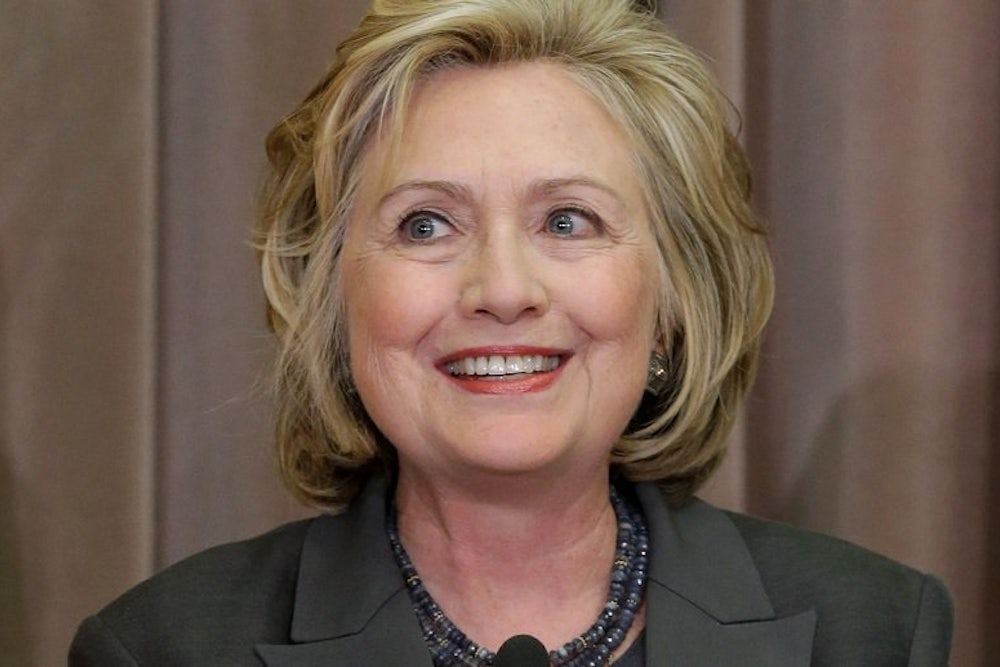Late Monday night, the New York Times’ Michael Schmidt reported that Hillary Clinton, when she was secretary of state, only used a personal email address for conducting official business. It’s just the latest in a string of negative stories that have put Clinton on the defensive—and should make Democrats extremely concerned about her uncontested path to the nomination.
The Times claims that during her time at the State Department, Clinton broke federal regulations about email use. “Her aides took no actions to have her personal emails preserved on department servers at the time, as required by the Federal Records Act,” Schmidt wrote. That may not be precisely true: The Daily Beast's Michael Tomasky discovered that the Federal Records Act only required Clinton to preserve copies of her emails, which Clinton appears to have done. It wasn't until October 2014—a year and a half after Clinton left office—that the State Department finally issued specific instructions for employee record management.
Still, it's a serious problem when government officials conduct business with personal email accounts because any messages sent and received are not archived on government servers. Those emails would not surface in Freedom of Information Act (FOIA) requests and subpoenas, creating a dangerous lack of transparency. That's why, also in October 2014, the State Department asked all former secretaries since Madeleine Albright to turn over any records from their time in office. “Mrs. Clinton’s advisers reviewed tens of thousands of pages of her personal emails and decided which ones to turn over to the State Department,” Schmidt writes. “All told, 55,000 pages of emails were given to the department.”
The Times doesn't say why Clinton didn't turn over all emails. If she and her advisers selectively chose which emails to hand over, we need to at least know the selection process. Otherwise, who knows what she left out?
The Clinton camp adamantly denies that it’s trying to hide anything. "Like Secretaries of State before her, she used her own email account when engaging with any Department officials,” her spokesman, Nick Merrill said. “For government business, she emailed them on their Department accounts, with every expectation they would be retained.” Hillary had every expectation, they say, that all of her communications from her time at the State Department would become public.
Clinton herself isn't speaking. As a still-unofficial presidential candidate, she doesn't feel compelled to answer questions about this latest damaging report. But she should—because it’s starting to appear that Clinton is far less prepared for a presidential run than anyone expected.
First, she made multiple gaffes about her own wealth, saying her family was “dead broke” after Bill Clinton left office. At the same time, she has given numerous speeches for hundreds of thousands of dollars. And over the past few weeks, the Wall Street Journal and Washington Post reported in separate investigations that the Clinton Foundation had accepted donations from foreign countries both during and after her time as secretary of state. Many of those countries, like Saudi Arabia, do not have stellar records on human rights.
For a would-be presidential candidate with her deep experience in Washington, that’s a lot of unforced errors. The foundation shouldn’t have accepted donations from foreign countries so that no one could ever accuse Clinton of being influenced by that money. She should have stopped giving paid speeches a long time ago. And she should have used a government email address at the State Department. These should all be easy decisions to make, and yet Clinton got them all wrong. (And, in the case of the paid speeches, continues to get wrong.)
This should frighten Democrats. Who knows what other past mistakes might surface, or ones yet to come? It hasn’t taken much digging from journalists to find these stories. Republican opposition researchers are surely going into overdrive now that they smell blood in the water.
The best way for a party to vet a candidate, and get all of the dirt out of the way, is in a primary. But the Democratic Party is not going to have a competitive primary. At best, former Maryland Governor Martin O’Malley and former Senator Jim Webb will be her challengers. That’s not a particularly tough primary.
The wild card is Massachusetts Senator Elizabeth Warren, whom liberals have long wanted to run for president. Warren has basically ruled out a presidential run. She has made no moves to indicate she is considering one. But as she sees Clinton struggle before even hitting the campaign trail, Warren—and other party leaders—has to be thinking about it more every day. She probably wouldn't win, but it would still make for a far more competitive primary, take some of the heat and press coverage off Hillary, and make her a far more battle-tested candidate for the general election. That’s exactly what the Democratic Party needs.
